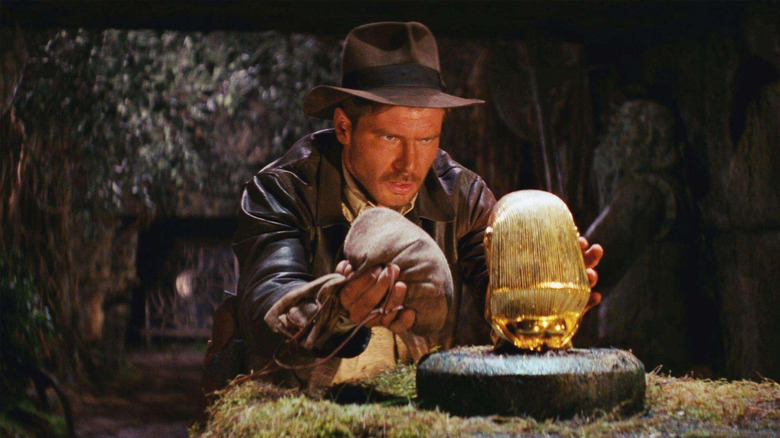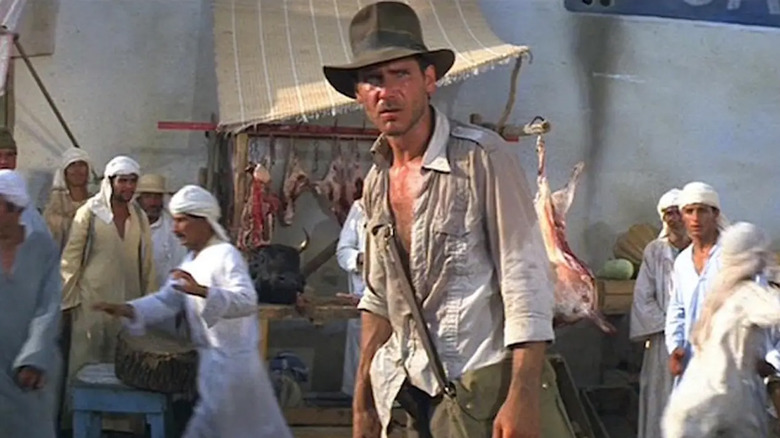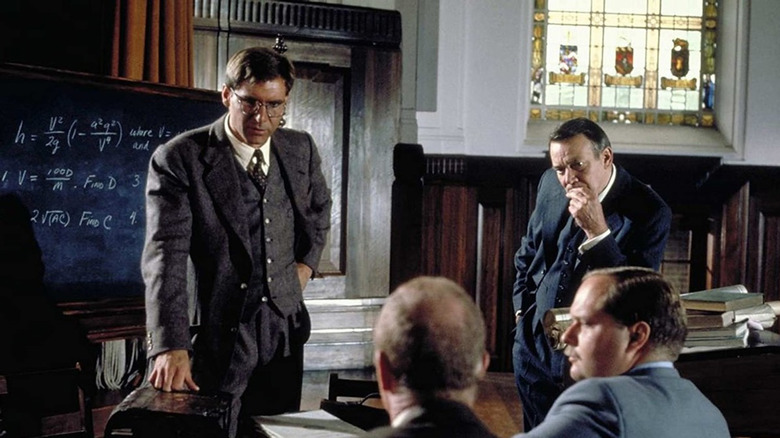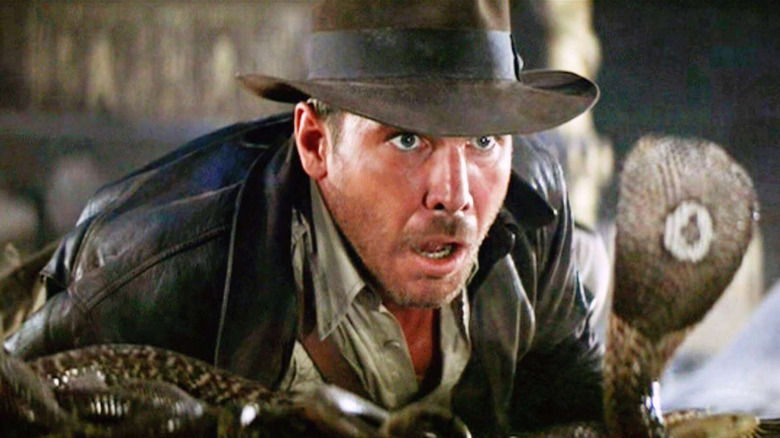Steven Spielberg Made Indiana Jones A Tough Sell To Studios
Back in 1981, "Raiders of the Lost Ark" changed everything. It introduced Indiana Jones, the quick-witted, whip-cracking archaeologist who believes everything belongs in a museum. But I'm getting ahead of myself. Before his first big adventure made its way to the big screen, Indiana Jones was just a concept — one the studios weren't convinced by.
We all know the story. "Raiders of the Lost Ark" stars Harrison Ford as our titular hero, an archaeology professor and adventurer who heads off in search of the lost Ark of the Covenant — that's right, the Ark of the Covenant that holds the original Ten Commandments. It's a tale of murder, intrigue, Nazis, and an action-packed intro featuring an iconic boulder. Tasked with finding the Ark of the Covenant before the Nazis do, Dr. Jones embarks on a globe-trotting adventure like no other.
Sure, the film now permeates pop culture, but it wasn't always so highly regarded. Based on dime-store novels and pulp fiction stories, "Raiders of the Lost Ark" certainly had instant appeal. A market was there. The trouble was, the studios didn't want to take such a big leap of faith. Creator George Lucas told Empire:
"'Raiders' was turned down by practically every studio in town. They thought it would be a successful movie but didn't trust the budget: $20 million."
It was a lot of money to ask for a property that had no existing fans and no guaranteed ticket sales. But there was another reason "Raiders of the Lost Ark" was a tough sell: Steven Spielberg.
It's not the years, honey. It's the mileage.
These days, Steven Spielberg is a box office draw all by himself, but that wasn't always the case. His first big hit came in 1975 with the critically adored "Jaws," the iconic shark attack movie that paved the way for Spielberg's illustrious career. Hot on the heels of that, he followed up with the sci-fi epic "Close Encounters of the Third Kind," another smash hit.
At this point, it seemed like he could do no wrong. And then came "1941." A spoof World War II film with an ensemble cast including Dan Aykroyd, John Belushi, John Candy, Christopher Lee, and Mickey Rourke, "1941" sounds like it should have been another hit for Spielberg. Unfortunately, audiences didn't turn out for it — at least, not in the kinds of numbers that were expected after "Jaws" and "Close Encounters." Spielberg said it himself — he played it safe:
"On '1941,' I became a bit like Colonel Kurtz. After my big successes, the studio was too afraid to dispatch Martin Sheen to terminate my command with extreme prejudice. Now I just wanted to make a movie where people would say he's a responsible director who came in under budget and under schedule."
Unfortunately, the studios wanted another hit release to follow Spielberg's earlier hits, and despite earning over $90 million, "1941" was considered a failure. And that made studios nervous when it came to "Raiders of the Lost Ark." Actor Jon Rhys-Davies, who played Sallah, said:
"Steven had just had a relative critical failure with 1941 and the knives were out — the whizz-kid had clay feet, he was just a flash on the pan."
But despite trepidations, his old pal George Lucas wouldn't budge. He wanted Spielberg on the film.
We have top men working on it right now.
It's no secret that George Lucas and Steven Spielberg had been friends for a long time. Famously, they swapped a percentage of profits on each other's movies to support each other, with Spielberg showing he had confidence in a little indie sci-fi flick George was working on called "Star Wars."
Clearly, Lucas wanted to repay that confidence when it came to "Raiders of the Lost Ark." But he wasn't going to go easy on the studios. He told Empire: "I was asking for a very tough deal; it broke a lot of precedents that no one wanted to break. Its definition of profits upset their apple cart."
Essentially, he was asking for a $20 million budget — more than Spielberg's admittedly large "Close Encounters" budget. More than that, he didn't want to give up his rights to the Indiana Jones saga. He continued:
"I would develop it and turn it over to them, which gave them little control. They didn't like that. I had licensing. I controlled sequel rights. Things that fed off what I did with 'Star Wars.'"
After the huge success of "Star Wars: A New Hope," it's not surprising that Lucas wanted a similar deal. After all, he later went on to sell Lucasfilm for a staggering $4 billion. Lucas clearly had a plan. Thankfully, he wasn't willing to give up on Spielberg.
You know what a cautious fellow I am.
After "1941," the studios were obviously worried that Steven Spielberg's success was a flash in the pan. Thankfully, George Lucas carried a lot of weight. After all, he had just created one of the most financially successful movies of all time, and that's a pedigree the studios could put their faith in.
But they still weren't sure about Spielberg. "The studio was saying, 'If you can get another director in there who we have more confidence in, then you can do it.'"
Thankfully, Lucas wasn't going to give up on his friend. He continued:
"I was committed to Steven. We'd had a long talk about how we were going to make the movie. I trusted Steven. He had directed television. He knew how to do what had to be done."
Ultimately, Paramount agreed to take on "Raiders of the Lost Ark" with Spielberg attached. And well ... the rest is history. "Raiders of the Lost Ark" was a commercial success, earning a massive $212.2 million, making it the highest-grossing movie of 1981. Most importantly, it was critically acclaimed and is now recognized as one of the greatest movies of all time. Not bad for a director they didn't even want.



